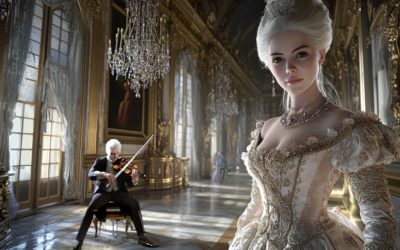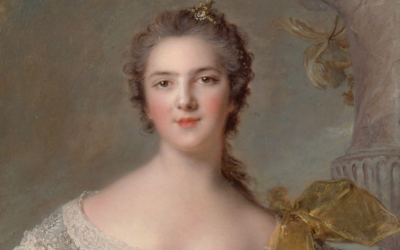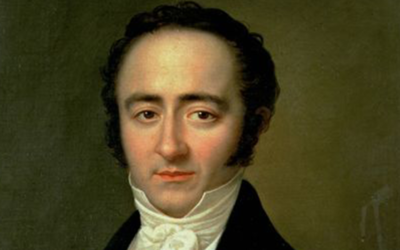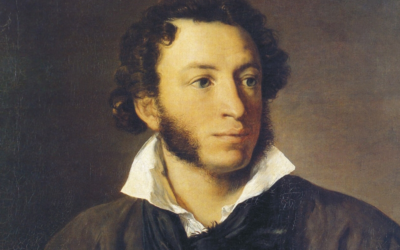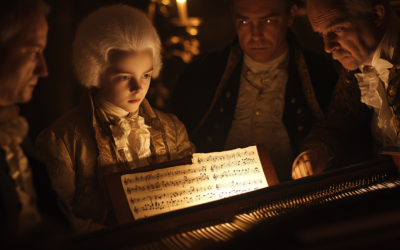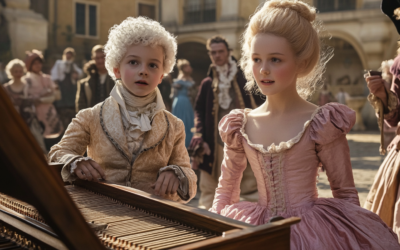The 1931 Festival and Its Legacy
Mozart and the Nationalist Illusion
The 1931 Mozart Festival, meant to celebrate the composer’s 175th anniversary, became a platform for nationalist propaganda. Beneath the guise of universalism and cosmopolitanism, Mozart’s music was used to reinforce German cultural supremacy. Erich Schenk and his fellow Nazi-aligned musicologists manipulated Mozart’s legacy, sidelining Jewish scholars like Alfred Einstein, and shaping a narrative of racial superiority in the arts.
Mozart: The Fall of the Gods
This book compiles the results of our studies on 18th-century music and Mozart, who has been revered for over two centuries as a deity. We dismantle the baseless cult of Mozart and strip away the clichés that falsely present him as a natural genius, revealing the contradictions in conventional biographies. In this work, divided into two parts, we identify and critically analyze several contradictory points in the vast Mozart bibliography. Each of the nearly 2,000 citations is meticulously sourced, allowing readers to verify the findings. This critical biography of Mozart emerges from these premises, addressing the numerous doubts raised by researchers.
"By parodying the works of foreign musicians, Mozart vented his anger and disdain for the frivolous, insipid music that foreign composers could use to win fame and fortune."
A. Einstein
The 175th anniversary of Mozart’s birth in 1931 was the long-awaited moment for a national resurgence, using his music to foster a sense of unity in a country struggling with internal divides. The celebrations, however, were marked by a troubling juxtaposition: amidst the anti-Semitic chants of the Spielschar Ekkehard and the performance of Mozart’s Lieder in the streets, there was a forced attempt to keep national pride alive.
During the 1931 Festival, Mozart’s music was draped in internationalism, cosmopolitanism, and universalism—terms that barely concealed the underlying focus on Germany. His work, hailed as “timeless,” was described as übernational (supranational), a label intended to elevate it above mere internationalism. In truth, this framing served to reinforce the idea that Mozart’s art was a reflection of the uniquely profound and privileged German spirit, which, it was claimed, was the only culture capable of attaining the absolute in the art of sound.
The supposed cosmopolitanism of Mozart, as framed by figures like Guido Adler, the father of German musicology, and Robert Hirschfeld, rings ironically hollow. For them, and later for Arnold Schoenberg, Heinrich Schenker, and Paul Hindemith, the achievements of so-called “pure music” were proof of a transcendent universality—one that conveniently remained confined to German culture. This paradox reached its peak when, in 1941, the Nazis celebrated Mozart’s jubilee in Vienna, with fervent support from Richard Strauss, Wilhelm Furtwängler, and the entire German musicological community. As the great “Aryan” Mozart was honored, exiled composers like Kurt Weill and Schoenberg in America claimed themselves, not the Nazis, to be the rightful heirs of Mozart’s legacy.
In 1931, Alfred Einstein published Don Giovanni for Eulenburg Editions in Leipzig, hoping in his preface that this work would inspire “a new spiritual sense of music” and serve as a guide for the Germans to distance themselves from the philosophical interference of non-musical thinkers. Einstein’s optimism proved misplaced. The academic establishment, influenced by the anti-Semitic philosophies of the time, eventually denied him academic opportunities.
That same year, Oscar von Pander, writing for Münchner neueste Nachrichten, echoed the idea of Mozart’s unmatched purity and precision, despite the composer’s output spanning over sixty different styles. Pander cited works such as the Jupiter Symphony K.551 and the Ave Verum K.618, but ignored Mozart’s stylistic inconsistencies, promoting him as the ideal model for German composers in the midst of an economic crisis.
The 1931 congress of musicologists, held in Vienna during the celebrations, became the most significant musical event of its time, gathering Austria and Germany’s top minds to discuss the ultra-nationalist themes of the day: anti-Semitism, racial superiority, Mozart’s troubled relationship with Freemasonry, the national identity of opera, and the extent of German influence in his music. Erich Schenk, a prominent Salzburg musicologist, played a key role in organizing the event. Schenk deliberately ignored Einstein’s contributions, including his recent edition of Don Giovanni and his work on the Köchel catalog, because Einstein was of Jewish descent.
Schenk’s rise to prominence coincided with his support for Nazi ideology. After his studies in Salzburg, Munich, Vienna, and Berlin, he became a lecturer at the University of Rostock, aligning himself with the Grossdeutsche Volkspartei, which advocated for the union of Austria and Germany. When the Nazis came to power, Schenk’s loyalty was rewarded, allowing him to secure prestigious academic positions. After the Anschluss, he was appointed professor of musicology at the University of Vienna, where he trained the next generation of musicologists. He resurrected the xenophobic Mozart Studies (Mozartianische Studien) journals, first published by Hermann Abert, a nationalist biographer of Mozart.
Schenk’s career was marked by virulent anti-Semitism, which he practiced from the early 1930s until his death. He joined several Nazi organizations, including the NS-Lehrerbund (National Socialist Teachers League) and the NS-Dozentenbund (National Socialist University Lecturers League). He also worked as a temporary employee for Rosenberg’s intelligence office, providing information on Jewish students in the musicology department, many of whom disappeared or were forced to emigrate. Schenk contributed to Herbert Gerigk’s Lexicon of Jews in Music, a notorious Nazi publication, with the hope that it would help uncover more Jews to send to the concentration camps.
After the war, Schenk’s collaboration with the Nazi regime did not impede his career. He continued to hold his position at the Austrian Academy of Sciences, became Dean of the Faculty of Philosophy in 1950, and Rector of the University of Vienna in 1957. His nationalist ideals persisted, influencing his contributions to the Denkmäler der Tonkunst in Österreich, a collection of Austrian classical music, where he reinforced the German-centric division of the Baroque era, strategically ignoring composers like Scarlatti, whom the Nazis labeled as of “mixed or bastard race.”
Schenk’s legacy continues today, with the Mozart Society in Vienna awarding the Erich-Schenk-Preis annually to researchers who follow in his footsteps. His nationalist interpretation of Mozart lives on, casting a long shadow over musicology.
You May Also Like
The Adélaïde Deception: Mozart’s “Lost” Violin Concerto and the Art of Musical Forgery
In the early 20th century, the “discovery” of Mozart’s sixth violin concerto in Paris created a sensation. Dubbed the Adélaïde Concerto and supposedly written for Madame Adélaïde of France, it was hailed as a testament to Mozart’s genius. However, as the story unfolds, it becomes clear that this masterpiece was not the work of the child prodigy but rather a carefully orchestrated hoax by Marius Casadesus. Despite its unmasking as a forgery, the concerto continues to captivate audiences, raising questions about authenticity and the music industry’s willingness to deceive for profit.
K.6 and K.7 Sonatas: A Fabricated Genius?
The earliest sonatas of Wolfgang Amadeus Mozart, K.6 and K.7, are traditionally seen as proof of his precocious genius. But as we explore the murky origins of these works, we find that they may be more a product of Leopold Mozart’s ambition than Wolfgang’s musical talent. The truth, as always, lies somewhere between the notes.
Georg Nissen and the Missing Notebooks – Part II
This second part delves deeper into Georg Nissen’s scheme to expose the truth about Mozart’s death, and the roles of Constanze Mozart and her sons in keeping it buried. As new details emerge, the mystery surrounding the famous composer’s final days grows even darker, with powerful forces potentially at play.
Mozart and Salieri
Pushkin does not see Salieri as a mere mediocre. In fact, Salieri embodies the struggle of the artist, much like Michelangelo, who reaches greatness through relentless effort. Pushkin himself identifies with both Mozart and Salieri, but he emphasises that true art demands work, discipline, and sacrifice. In poisoning the Mozartian element within himself, Salieri performs a service to art, freeing it from the frivolity of effortless genius. ‘Can genius and malice coexist?’ Pushkin’s answer is complex, but in the end, Salieri’s act seems to affirm that true creation lies in the hands of those who strive.
The Fabrication of Genius
Leopold Mozart’s tireless efforts to promote his son Wolfgang as a child prodigy were rooted in manipulation, exaggeration, and a relentless drive for social success. Far from being a miraculous genius, Wolfgang was pushed into the spotlight by his father, whose grandiose claims often obscured the reality of his son’s abilities.
The Myth of Mozart
A critical examination of Wolfgang Amadeus Mozart’s life reveals a man shaped more by his father’s ambitions than by innate genius. Stripped of the myths, Mozart’s early years reflect a childhood dominated by relentless touring, inconsistent education, and a legacy built on exaggerated achievements. Discover the real story behind the legend.


